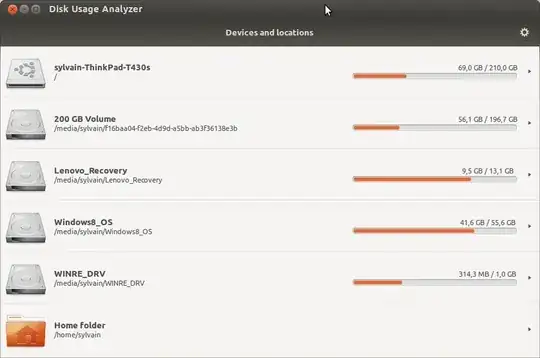I can see how much space using in Windows, since Ubuntu uses root concept, there is no particular hard drive any more. How can I tell how much space left using Ubuntu?
Asked
Active
Viewed 885 times
3 Answers
16
Command line
df -h
Example:
Filesystem Size Used Avail Use% Mounted on
/dev/sda1 46G 5,5G 38G 13% /
none 4,0K 0 4,0K 0% /sys/fs/cgroup
udev 2,0G 4,0K 2,0G 1% /dev
tmpfs 404M 1,3M 403M 1% /run
none 5,0M 0 5,0M 0% /run/lock
none 2,0G 23M 2,0G 2% /run/shm
none 100M 40K 100M 1% /run/user
/dev/sda6 23G 275M 22G 2% /home
/dev/sda7 289G 63M 274G 1% /data
Desktop
Search in dash for "system" and choose "system monitor":

Rinzwind
- 299,756
7
The problem with the other solutions is that they also list the files your have created and not only the space used by installed programs. For that I use something rather complex:
dpkg-query -W -f='${Installed-Size;8}' | xargs | sed -e 's/\ /+/g' | bc
So, what's this supposed to do?
dpkg-query -W -f='${Installed-Size;8}'shows the size in Kibibytes of all installed packages.xargsis to prevent that the next sed is applied to the last line.sed -e 's/\ /+/g'replace any instance of space character with the plus signbcis a command line calculator. It takes1234 + 12345from the stdin and returns the result.
References:
- https://stackoverflow.com/a/18355142/792066 (in the xargs/sed/bc command)
- https://askubuntu.com/a/373502/169736 for the dpkg query
-
And, according to this: https://bugs.debian.org/cgi-bin/bugreport.cgi?bug=534408 the number returned should be the number of kibibytes for the installed size of all packages. A kibibyte = 1024 bytes. – mkoistinen Apr 25 '14 at 00:18
